While I was writing the review of Ek Saal last week, I was reminded of this film. And that for what might seem an obscure reason to some: I S Johar was the man who suggested the story idea for Ek Saal, and he – now as actor, not writer – plays one of the important characters in this superb adventure film.
That connection got me thinking: how easy (or how difficult) would it be to do a series of posts – reviews, lists, whatever – that were in some way or the other connected to each other? If it were a case of just doing posts on Hindi cinema, probably not too hard a task. But, since I also blog about cinema from across the world: hmmm.
Anyway, so here goes. I’m putting my head in the noose. Beginning with this post (or Ek Saal, actually), the posts I do will all have some connection to the previous one. The link could be anything: story, setting, crew and cast, etc. I’ll go on until I either run out of ideas, or close the loop by connecting a post to Ek Saal.
Okay, squared shoulders now, and off we go.
North-West Frontier (aka Flame over India in the US and Empress of India in Australia) is in the time-honoured tradition of journey films like Ice Cold in Alex (which, perhaps not coincidentally, was also directed by J Lee Thompson, who directed North-West Frontier), Lifeboat, and Stagecoach. A group of strangers are thrown together by circumstances to make a journey that may well prove fatal.
Ice Cold in Alex and Lifeboat not only had a hostile backdrop of World War II, but also pitted their protagonists against the elements: against the Sahara, dry and brutal, in Ice Cold in Alex; and against the exact opposite – mile upon mile of cold, empty sea – in Lifeboat. In both films, too, the chances of the travellers ever reaching their destination are minute at any given time, not least because there’s a very real threat of getting irrevocably lost.
Seen from that point of view, North-West Frontier is perhaps more similar to Stagecoach. The travellers in both films know exactly where they’re going and how; there’s a definite route they have to follow, and little danger from the elements. The peril, in both cases, is from man rather than the elements.
The people who’re the threat in this film are introduced right at the start of North-West Frontier. The setting, of course, is the North-West Frontier Province (now in Pakistan). The period is a little vague – probably the first decade of the 1900s? – but the British are in the NWFP, and so is much tension. The fact of the matter is that the Raja (Frank Olegario) of the NWFP is a Hindu, and vast numbers of tribal rebels – ‘Moslems’ – are not at all keen to have him continue as ruler.
Matters have reached a head, and the Raja has realised that the Muslim rebels are too powerful a force for him to fight against any longer. He therefore turns to the British for help. Like the proverbial captain of a sinking ship, the Raja refuses to leave his post; but he wants the British to take his only son and heir, the 6-year old Prince Kishan (Govind Raja Ross) to safety. If they can get Kishan to the British garrison town of Haserabad, and from there to Kalapore, he will be safe.
The British officer deputed to ensure Kishan and his American governess, the widowed Mrs Wyatt (Lauren Bacall) reach Kalapore safely is Captain Scott (Kenneth More). Barely have he, Mrs Wyatt, Kishan and their escort ridden out of the fortress, than the rebels attack. The fortress is burnt, the king is killed – and Kishan, nominally at least, becomes the Raja.
Getting to Haserabad proves another problem: thousands of refugees are pouring into town, fleeing the arson and massacre let loose by the rebels. Haserabad is also the rail head, so people try to pile on to any train they can find that will get them out of Haserabad.
Things are so bad that Scott, Mrs Wyatt and their bodyguards have to get off their horses and push and shove to get into the British fortifications.
Once inside, they receive disheartening news: the last train from Haserabad has gone. The Governor of the province, Sir John Windham (Ian Hunter) tries to assure them that reinforcements will be arriving soon, and that Haserabad is a safe enough refuge for young Kishan. Scott – ever the soldier – merely looks doubtful, but Mrs Wyatt is frank enough to tell Sir Windham that if he thinks that, he’s just deluding himself.
Soon, matters get worse. The rebels, attacking on horseback and foot, get past the cannons of the British and capture the main outer gate of Haserabad. The inner gate and fortifications are still held by the British, but Scott (and Sir Windham, in his heart) knows that it’s just a matter of time before the rebels break through their fragile defences.
Scott, therefore, goes on a recce within the fort, and discovers that though the last train may have left Haserabad, there is still one battered old engine around.
This is named ‘Empress of India’, though her garrulous driver Gupta (I S Johar), affectionately calls her Victoria. He’s been in the Indian Railway Service for 30 years now, and has full faith in Victoria’s ability to do the long and arduous trip to Kalapore. With him, Scott works out a plan: how to carry sufficient coal to last the trip; which carriage to attach so that Mrs Wyatt and Kishan can travel comfortably; and so on.
The only problem is that when Victoria is up and running, she makes a huge amount of noise – noise that will certainly draw any rebels for miles around, and alert the rebels manning the outer gate, of course. So, as Scott explains to a small and sceptical audience, the plan is to have the train push-started till it begins to roll down the slope between the inner gate and the outer, gathering enough momentum to burst through the outer gate, by which time Gupta will have started up the engine.
There is much discussion on whether or not this plan will succeed. Eventually, everybody realises that they don’t have any other option; this is the only way out.
Fortunately, since there is a carriage attached to the Victoria, a few other people can also go with Mrs Wyatt and Kishan. These include two people who desperately want to get out of this besieged fortress and to more civilised areas.
One of them is the arms dealer, Peters (Eugene Deckers), who, though he insists he’s British – and has papers to prove it – does not actually appear to identify with the British. He’s also been selling guns to the rebels (a purely business venture, as he’s quick to clarify), but now he’s done with the NWFP and would like to get back to Delhi or wherever.
Another person eager to leave Haserabad is the Dutch journalist, Van Leyden (Herbert Lom). Van Leyden is bitter, outspoken, and not above the occasional bit of blackmail or subterfuge. His excuse for wanting to get out of Haserabad is that he wants to let the world know what is happening here.
Then there are two people who are bullied, by Sir John Windham, into leaving Haserabad for their own safety. One is the elderly Mr Bridie (Wilfrid Hyde-White), who has been living in Haserabad for the past 21 years and is clearly most distressed at having to leave his home – even though Windham assures him that he can return as soon as things quieten down.
The other is Lady Windham (Ursula Jeans). Lady Windham has spent the past few days helping to look after those injured in rebel attacks, but now her husband has decided he would rather have her far away and safe, than beside him and in danger of being killed in the fighting. She tries to fight back and tells him that she doesn’t want to go, but he’s adamant.
That night, Scott and his entourage, along with two Indian soldiers – Kumar (S S Chowdhary) and a havildar (S M Asgaralli) – set off aboard Victoria. With Gupta at the engine, they burst through the gates, manage to shake off the rebels who try to give chase – and head out into the countryside, off to Kalapore.
But there’s a lot in store for this motley collection of people. Their sole means of covering what seems an impossible distance is an engine that’s old and ramshackle. Their pursuers – the rebels, who know that Kishan is aboard the train – are always in the vicinity, keeping track of the little train’s progress, and attacking whenever they have the chance.
…or, when they’re not attacking, they’re doing all they can to disrupt Victoria’s passage: blowing up the tracks, for instance.
How far will Captain Scott be able to get with his charge? And what other dangers lurk, hidden perhaps closer than Scott imagines? Will Victoria make it? Will Scott and Mrs Wyatt be able to get Kishan safely to Kalapore?
This is one of the most enjoyable adventure films I’ve ever seen. It’s gritty, fast-paced, with superb characterisation and excellent acting. Absolutely and wholeheartedly recommended.
What I liked about this film:
Everything, of course, as I’ve made pretty obvious in all that gushing, above. But, in particular:
Kenneth More. One of my all-time favourite British actors, and one who I think was unfairly slotted by many as just ‘a good comedian’. Yes, he was superb at comedy – Doctor in the House is ample proof, even winning him a BAFTA award – but he was extremely versatile. Look at Sink the Bismarck!, for instance – such a wonderfully restrained performance. In North-West Frontier, too, he’s at his best, firing, driving an engine, and fighting on the roof of a running train like the best of ’em.
Another: the characterisation. I like films that have a small cast, where there’s scope for you to get to know people well. This one’s another example. Through the journey of Victoria from Haserabad onward, small incidents and brief conversations reveal a lot about this group of people. Why, for example, Scott became a soldier. Or just how very typically (stereotypically?) English Mr Bridie is. Or why Mrs Wyatt will go – against every injunction – through a trainful of massacred refugees, just to save a single baby.
Interestingly, though this is a British film and so is primarily loyal to King and Country, it does have its moments of going against the grain.
For example, there’s this dialogue between Van Leyden and Captain Scott, shortly after Victoria has chugged into a deserted railway station where they find the last train from Haserabad, now full of corpses that the rebels have left behind after massacring all the passengers.
Scott: “All right then, Van Leyden. Have a look. Have a good look! – and see what happens when the British aren’t around to keep order!”
Van Leyden: “Keep order? You?” (laughs sarcastically). “You divide. Set Moslem against Hindu. You divide in order to rule, that’s what you do.”
Scott (by now frustrated): “The Moslems were fighting the Hindus for hundreds of years before we came to India! And well you know it!”
(Van Leyden finally heads back to the carriage, but has to make his way through the platform, which is strewn with bloody corpses, flies buzzing all over them. He walks a couple of steps, looking around him; then he turns and looks at Scott): “You call this ‘keeping order’?”
(The last conversation in the film between Scott and Kishan is also delightfully wry).
Note: While Gupta speaks English (though, as Kishan tells him in one scene, “Gupta, your English is hopeless!”), the two other Indians – the soldiers on Victoria – speak only Hindustani. So Scott always speaks Hindustani to them (not a terrible accent, either, More!). These are mainly instructions, brief orders that don’t really need explaining to an audience that doesn’t speak Hindustani. But there is one dialogue that should have been subtitled, it’s so cuttingly good:
A villain flings at Gupta the accusation that he is a gaddaar – a traitor. Gupta’s response: “Agar maasoom bachchon ka khoon karna hi desh-seva hai, toh main gaddaar hi achcha hoon.” (“If murdering innocent children is patriotism, then I am better off as a traitor).”
What I didn’t like:
As someone who’s incorrigibly nit-picking, I’ll admit that the sight of what was obviously a Rajasthani fort – though it could have been in adjoining areas such as Madhya Pradesh – is a little jarring. This seemed so not the NWFP. But at least it was the Indian subcontinent, which was far better than The Charge of the Light Brigade could manage. (And, another plus for North-West Frontier: all the extras seemed to be people from the subcontinent, rather than Caucasians in brownface).
But that’s it. Other than that, I love North-West Frontier. It’s a vastly entertaining watch, and an interestingly Brit take on the traditional Western.
(Which reminds me: if Sergio Leone’s films were spaghetti Westerns, and Sholay is called a curry Western, what is North-West Frontier? A bangers-and-mash Western? Or, considering how we Indians have succeeded at colonising them: a curry Western, after all!)

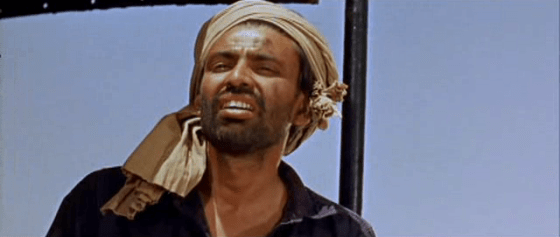

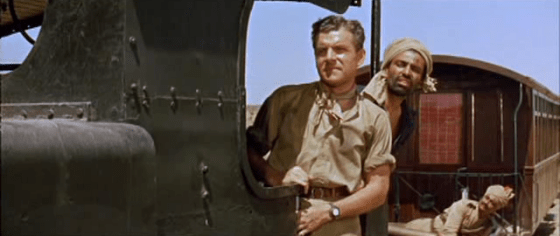
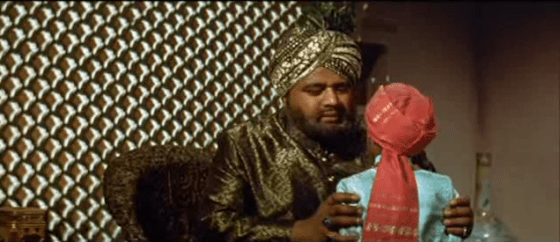
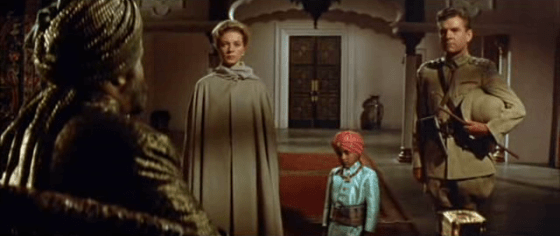
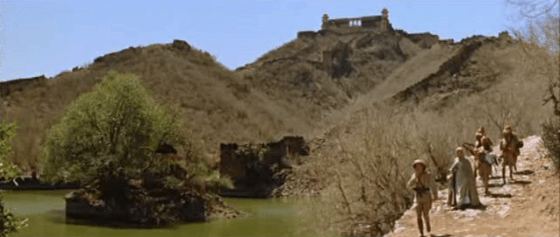
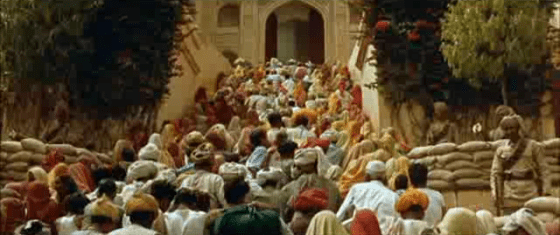

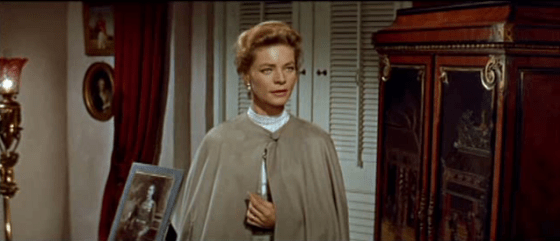
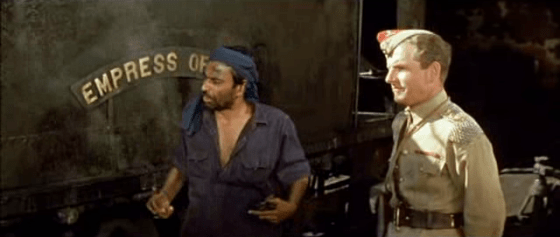



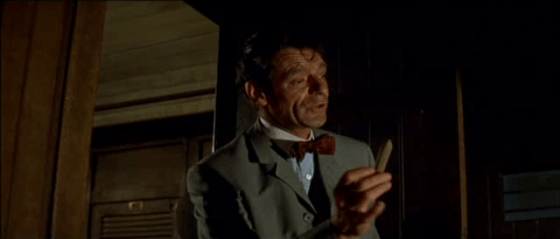
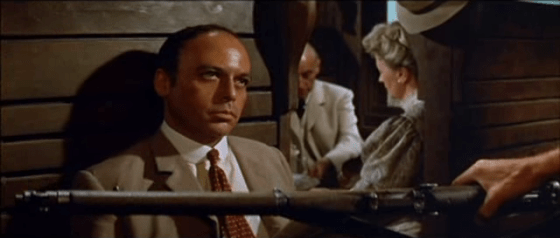

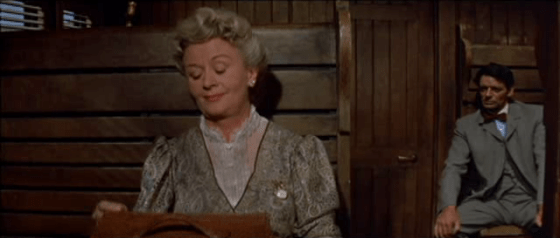
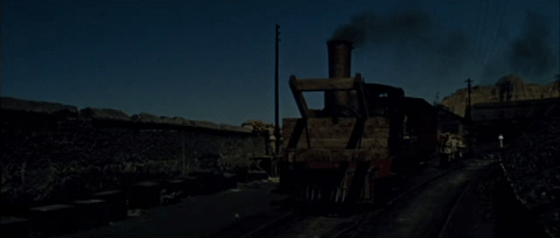

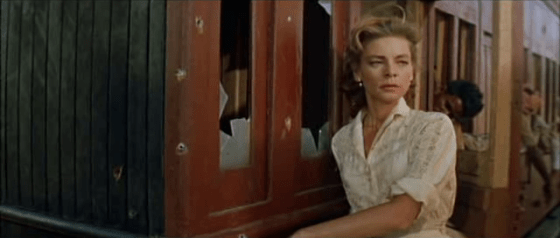


Oh, so this was another film that IS Johar did after Lawrence of Arabia. Lets see what you link up to next. Reminds me of a song show called Link’d on zoom where the songs are similarly linked.
LikeLike
According to IMDB, I S Johar had also worked in the Stewart Granger-starrer Harry Black and the Tiger, which I’ve been trying to lay my hands on – I have heard it described somewhat as ‘Jim Corbett onscreen’. Sounds good.
My husband said, “What you’re planning to do sounds like antakshri with yourself!” ;-)
LikeLike
haha… it is a popular game.
LikeLike
And I love playing it! – so, no wonder I’d want to do something like this.
LikeLike
I saw this movie many years ago and I remember liking it. I.S. Johar did such a fine job in this one, I usually remember him as a hammy/OTT comedian (Not that I do not like hammy/OTT). In fact (& you probably have seen this) he was pretty hammy/OTT in Agatha Christie’s “Death on the Nile”, with Peter Ustinov as Poirot. He always stole some scenes in his movies, whether it was this one or D-o-t-N, or Lawrence of Arabia.
Love the ending discussion re: Spaghetti/Banger-and-Mash/Curry Westerns.
LikeLike
Sad to say, Samir, but I’ve actually never got around to seeing Death on the Nile, though I have read it – years ago, which means I’ve forgotten it by now! Peter Ustinov was Poirot? That in itself is good reason to watch it – I think he was a very fine actor.
P.S. So what do you think? What sort of Western does this sound like? Curry, no? (Incidentally, that last screenshot, with the train racing through the clouds of dust, with screaming tribals riding their horses and brandishing guns alongside, is almost exactly the same as a corresponding scene in Stagecoach.
LikeLike
Most certainly Curry Western, and with the British having invented this dish, why not Chicken-Tikka-Masala-Western ?
Nowadays the British take their Indian food very seriously,
our new English neighbor proudly showed us his separate heavy cast iron small kadai meant just for roasting Indian spices. Apparently (& we did not know this), the high heat warps either regular kadai’s/vessels, or something to that effect. So of course now we have to actually learn to cook Indian food from grandmother principles if we have to invite them over.
Stagecoach is another movie I have yet to see, will do so.
LikeLike
Chicken tikka masala Western it is.
I am very impressed by your neighbour’s dedication to his curry – even I (who hold a diploma in hotel management and so can lay some claim to being a trained commis – if not a chef, exactly) – don’t have a special kadahi for roasting spices!
I was reminded, though, of an incident my sister related. She and her husband were on their annual vacation and had stopped off for a few days in the UK. Since my brother-in-law studied law at Cambridge, he has a lot of friends in the UK. One couple invited the two of them over for dinner – and made the entire meal at home, proudly telling them that it was ‘a full Indian dinner’. My sister told me later that she was glad they said that, because on her own, she’d never have recognised the food as Indian! Imagine the faux pas…
LikeLike
As usual my first comment
‘never ever heard of this film!’
Then my second usual comment:
‘sounds good!’
And then the third:
‘have to get a copy of it!’
;-)
LikeLike
I’d concur with all three comments! ;-)
LikeLike
LOL, harvey. I’ll second all your comments!
LikeLike
Haha! Absolutely true!! :-)
LikeLike
The ‘have to get a copy of this’ is especially true for North-West Frontier! :-)
LikeLike
having said my usual ones, now to the proper ones
I can watch anything with Lauren Bacall in it! Love her!
The way you have described it, it sounds damn good! And am very glad that the ‘keeping order’ dialogue takes place and that was the first thought which came to my mind as well. That the colonial rulers would often let the populace rebel against an unruly raja. Who were mostly big corrupt lecherous despots.
It is the same thing which is happening in the world right now. You are a good dictator, if you sell your oil (or let your harbours) without much ado to the US and if you don’t, then democracy has to be brought to your country. ;-)
LikeLike
And Lauren Bacall plays a very important – in fact critical – role in this film; she’s not just relegated to being a perhaps-love interest.
One thing I liked about this film was that they didn’t try to justify colonialism. Despite the fact that the film is set in British India, and that it’s about Indian rulers joining hands with the British in order to hold on to their thrones, the film still does – sometimes in a roundabout way – show that there could be valid questions about colonialism. Van Leyden’s last question to Scott in that conversation just couldn’t be answered.
And, as you point out, things really haven’t changed that much even now, have they?
LikeLike
Good idea of serial posts! This way we can feverishly look forward to how or what your next post turns out to be. I can only see three exits right now (if the next post is on Hindi films):
I S Johar
train
or
Fortress
This is like an Agatha Christie novel!
*rubbing hands*
LikeLike
Or:
– British India (as a setting)
– Or one of the other actors (I decided I wouldn’t use the same person as a link in more than two consecutive posts, so if I S Johar was the link with Ek Saal, I won’t use him as the link to the next post)… Kenneth More, Lauren Bacall or Herbert Lom: all have some amazingly good movies to their credit.
– J Lee Thompson, who also directed some other superb films – like Ice Cold in Alex
Or, of course, one of your suggestions. :-)
BTW, I have already plotted out – on a flowchart – my next nine posts!
LikeLike
You know what you can do?
At the end of each post, you can list 5 possiblities for the next post and see what people vote for. You don’t have to follow the vote but it would be fun to see what your readers expect. National Geographic used to do that with their front covers.
LikeLike
That is an idea! But, considering that I’ve already charted out how I’m going to do this, it might disappoint a lot of people if what they vote for doesn’t get selected, even if that’s the most-voted of all the options. Besides: the surprise element will go, no? Or maybe I should just ask people what they think my next post might be? It might be interesting to see what people come up with!
LikeLike
Yeah, that is a good idea! I mean the latter one!
LikeLike
Will do! :-)
LikeLike
So I S Johar was indeed talented. I had seen him in Murder on the Nile also. And you are quite some adventure seeking person also! Taking on this interesting blog task!! Bon Voyage!!
LikeLike
Thank you, Sharmi! I hope the journey will be as entertaining for the readers this blog as it’s going to be exciting for me!
LikeLike
Madhu, after my comments on Harvey’s comments – I am a sucker for historical and/or period movies. Add swashbuckling adventure to it, and I will enjoy it even more. So now off I go to see where I can get my hands on a copy.
LikeLike
Here you go, Anu:
LikeLike
*surprised* Thanks, Madhu. I didn’t even think of looking on Amazon for it! Will place an order right now!
LikeLike
I hope you like it!
LikeLike
ddvNow this is interesting, I knew about I.S.Johar’s bit role in Lawrenceof A Arabia, there was a lot of ‘hungama’ in the film industry when he signed this film after all it was a film with stalwarts David Lean, Peter O’Toole and Omar Shariff but I was unaware of this film. Now I have to look out for this film sounds interesting.
LikeLike
Yes, I hadn’t known I S Johar acted in several pretty well-known Hollywood or British films. And these days… Aishwarya Rai acts (if one can call it that!) in The Pink Panther and so much is made of it!
LikeLike
Dilip Kumar was asked to do the role which later on went to Omar Sharif in Lawrence of Arabia.
LikeLike
Yes, I knew about that. I’ve often wondered if he went on to regret that decision, seeing as how Omar Sharif made it fairly big in Hollywood after Lawrence of Arabia.
LikeLike
I don’t think he regrets it. Here is an excerpt from his Filmfare Interview:-
“But I thought if the whole thing turns out to be slightly indifferent, as I had seen happening with other Asian actors on the Hollywood scene, the Western scene, I feared it would affect my own standing with my own people, which is my permanent market. For me at that time it seemed to be an unnecessary risk. However, when the film was out, Omar Sharif made a tremendous mark and the impact he made as that Arab, I don’t think I could have done that. I’m sure Omar Sharif was a better choice.
Then there had been certain other offers, but I feel if we go to the Western market, it may have a novelty value. But you can’t think of a permanent career in Hollywood, so it’s better for us to stick to our own area and try and do the best we can.”
LikeLike
Yes, that certainly doesn’t sound as if he regretted it. I also think he has a point – a lot of people who ‘migrated’ to Hollywood, despite being fairly big stars in their own countries, seemed to end up doing just Hollywood, and not much more of the cinema they grew up with. Omar Sharif himself. Or Charles Boyer, or Louis Jourdan.
Though Dilip Kumar’s comment about “you can’t think of a permanent career in Hollywood” may not ring true for everybody, but it does have some truth in it. People like Boyer or Sharif or Jourdan may not have retained the huge fan followings that they commanded at home, and they may not have been stars in the league of say Cary Grant or Paul Newman… but they were well-respected. But was it worth leaving their own countries? Who knows.
LikeLike
Sounds like a fascinating film, which I might try to find. It’s probably a bit weird that the strongest reason for doing so is because it reminds me of one of the few things of my grandfather (apart from his carom board) that I have – an eggcup with the “NorthWestern Railways” logo on it. So any film set on the network he ended up Deputy Traffic Controller of grabs my attention :)
LikeLike
That IS a coincidence, Stuart – my grandfather was in the Railways too, though I don’t know if he was with the NorthWestern Railways or not! But his job was obviously a cause for much envy: there’s a cute letter, dating back to 1938, when my aunt (then 12) wrote to her eldest brother Harry, who was studying in Sweden. There’s a delightful sentence where (apparently in response to a query from Harry) she writes: “Vernie (one of my uncles, then 6) says he wants a Meccano set, and Johhny (who was then 3) says he wants an engine”.
Not surprisingly, Johnny Uncle grew up to join the railways – and became an engine driver!
LikeLike
What a sweet story! My family’s stories of the Railways are less fun – the violence of Partition, including my grandfather having his staff murdered in front of him and then, as Deputy Traffic Controller for the network, being offered the opportunity to stay on in the new Pakistan Railways as a ticket collector. Instead he upped sticks and ended up here, shukran allah! :)
LikeLike
I can imagine how traumatic that experience must have been for your grandfather. My mother’s family (she was only 5 at the time) were in Amritsar at the time of Partition, and since they were Christians (and known to be so), they didn’t get directly affected by the violence – but my mum still remembers some awful incidents from that time, including a horrendous train journey from Amritsar to Calcutta, when they finally fled.
LikeLike
Yrch! Amritsar to Calcutta! That sounds terrible. My Dad’s family were in Karachi by then and grandfather booked passage on two ships, one coming from and returning to, London, the other to Auckland and said they would take whichever one got to Karachi first. That’s why I say that Partition is the reason I am.
LikeLike
That IS interesting. So you may just as well have ended up in London, huh?
My mother recalls the train journey to Calcutta being horrific – basically, every train was jam-packed. At one time, my grandfather had to squeeze out through the window in order to get out and get drinking water for the family.
LikeLike
Yes, my Dad’s family might have ended up in London, though if he had, the chances of him meeting my Mum from NZ seem rather small. I can’t imagine such a long train journey in those conditions – that’s almost exactly the entire length of NZ, a trip not possible by train at all.
LikeLike
S.S.Chowdhary was my father, sadly he passed on in 1995. Northwest frontier is always great for me to show my children and others Sam in action. He also played other roles in ‘Danger Man’ with Patrick McGoohan and ‘The Saint’ with Roger Moore. Sam Chowdhary loved his acting roles but gave up to become a successful businessman. I recall his last role as being in the 1980’s film ‘Water’ with Micheal Caine.
LikeLike
Thank you for letting me know! One thing in particular that I liked in NorthWest Frontier was that Indian roles were played by Indians rather than by whites in brownface. Having seen dozens of Hollywood movies with whites poorly disguised as Indians, this was a very pleasant surprise. And I thought your father essayed his role very well: he projected that loyal stolidity of the quintessential Indian OR perfectly.
LikeLike
Love this film, especially since Govind was a friend of mine. I only met him after the film, just 10 or so, when he moved in across the road. I never found out about the film until much later, he said a little about being in a film but nothing to much.
I remember going to his house one day, and his father offered me tea – mum was out visiting. I said yes please, and he made it and when he poured it, it was hot water ! He apologised so much. Govind said “Excuse my Father he is not used to making tea” and went to get the tea leaves. Great family and lovely people, I would love to meet them again sometime
LikeLike
Thank you so much for commenting, and more specially for sharing that delightful little snippet of information! I can well imagine my father doing something similar as Govind’s father did. They sound like wonderful people. I did read some trivia about Govind not knowing any Hindi, so needing rigorous coaching for the few words he did need to speak in Hindi rather than in English. The entire film must have been quite an interesting experience for him.
I do hope you get to meet Govind again someday – and if you do, do tell him how much I love this film!
LikeLike